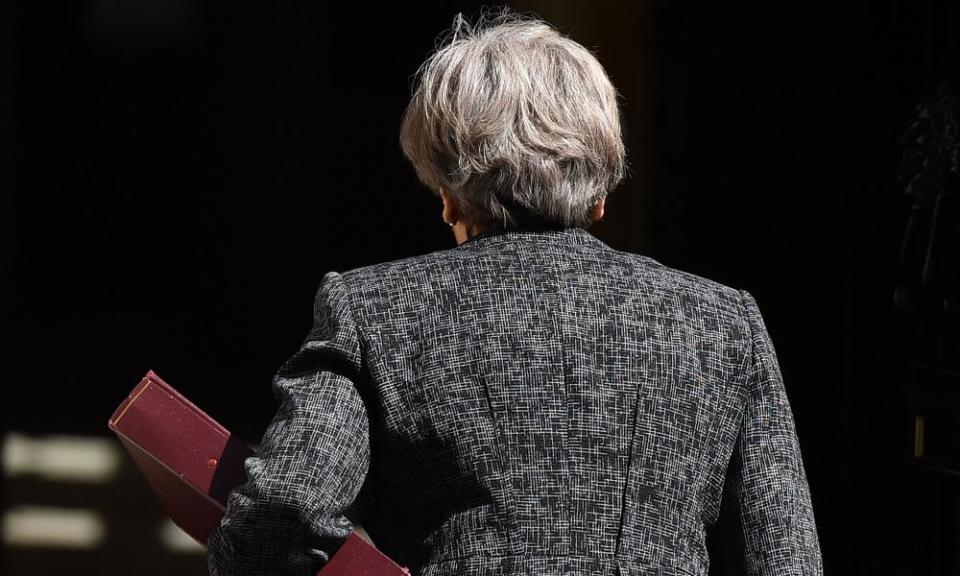Brexiters have voted for a poverty even worse than austerity

When I suggested before the election that an ideal outcome would be a hung parliament and a coalition to think again on Brexit, I was certainly not thinking of the DUP. But, as Harold Macmillan once said: “Here we are, and the question is: where do we go from here?”
It seems to be generally agreed that the election result boiled down to a vote against austerity and a vote against a so-called “hard Brexit”, with the young – predominantly Remainers and angry about austerity – in full swing.
The vote against austerity was long overdue. Under Cameron and Osborne the Conservatives got away with blue murder in blaming the world financial crisis on Labour in general and Gordon Brown in particular. Their obsession with “the deficit” hoodwinked people who do not understand that a nation is not a household, and that cuts in public expenditure are the reverse of what is required in a time of depression.
All economies need a period of rapid growth after a recession. This was denied the people of this country, who have finally rebelled. Way back in 1980, in the early stages of Mrs Thatcher’s sado-monetarist regime, the great JK Galbraith wrote in this newspaper: “British social services and social insurance soften what elsewhere might be intolerable hardship. British phlegm is a good antidote for anger; but so is an adequate system of unemployment insurance.”
Unfortunately, the gaps in our social safety net are showing, and in some cases a government obsessed with reducing the size of the state has deliberately ripped that net apart.
Thinktanks are vying with one another to tell us about a record period of negligible growth in living standards. Alas, things are becoming even worse as the referendum-induced devaluation bites further into real incomes.
The terrible thing about the prospect of Brexit is that our underlying economic situation is already bad enough, and the Brexit decision, if not reversed, is guaranteed to make things a lot worse. In economics there are time lags between announcements and their consequences, and under George Osborne the Treasury overdid its warnings about the timing of the referendum’s effects. Only now are people beginning to realise the consequences of the decision made last year by the world’s financial markets that Britain had, in effect, voted to become poorer and less secure. The devaluation constituted a reassessment of this country’s economic prospects.
It was Philip Hammond, Osborne’s successor, who, in challenging Theresa May’s obsession with a hard Brexit, maintained that the people who voted for Brexit did not vote to become poorer. But that is what the 51.9% of those who voted in effect did.
There were those who thought that the fantasy of a 150-seat majority would enable May to see off the hard Brexiters and pursue a more sensible policy. But all the evidence suggests that she meant what she said: that she put reductions in immigration above all else, and was prepared to leave the customs union and the single market in order to realise this dubious aim.
It is this preparedness to leave the single market that puzzles me most about the Brexiters. On the whole, these are people who worship the memory of Margaret Thatcher and thought she could do no wrong. My own view is that she did quite a lot of wrong, but that the single market was a great achievement, working very much in our economy’s interests. Yet these latter-day Thatcherites are prepared to give it all up in their mystical pursuit of “sovereignty” and “control”.
One of the results of the election is that May is now so weakened that she has no alternative but to hang on to a chancellor who knows that Brexit is self-damaging nonsense. Hammond is trying to make the best of a bad job: in remarks on Friday before an EU meeting, he rightly emphasised the need for the UK to concentrate on jobs, growth and the needs of business. Pace the Duke of York, the needs of business do not include Brexit. On the contrary. The Duke of York should stick to what he knows.
Earlier in the week, Harvard University released a highly relevant report written by Ed Balls, who needs no introduction, and Peter Sands, former chief executive of Standard Chartered. Originally conceived as a way of helping British business to cope with Brexit, the report seems to this correspondent to deliver a very simple message: British business would rather not have to cope with Brexit at all. Thus, “contrary to much of the media and political commentary, the majority of businesses … were broadly satisfied with current regulatory approaches in their sectors”, and “many spoke to the overall quality of EU regulations and rule-making processes”.
This is the nub. It is hardly surprising that Lord Bridges, who has been finding it increasingly frustrating trying to find a workable approach to Brexit for the government, has resigned from the Department for Exiting from the European Union in apparent disgust. Yes, he has exited the Department for Exiting. I am not making this up. And I don’t blame him. When will my old friend David Davis finally get the point?
Which brings us to the statesmanlike way in which Emmanuel Macron, the president of France, offered Britain a route back from the cliffs towards which May has been heading: “Until negotiations come to an end there is always a chance to reopen the door.”
Lord Adonis has said: “We are at a moment of national crisis, with echoes of the 30s.” His fellow peer, Michael Heseltine, has suggested that the problem could be sorted out at heads-of-government level, and that it should not be impossible to achieve the kind of concessions that eluded David Cameron. The stakes are that great!

 Yahoo Finance
Yahoo Finance 